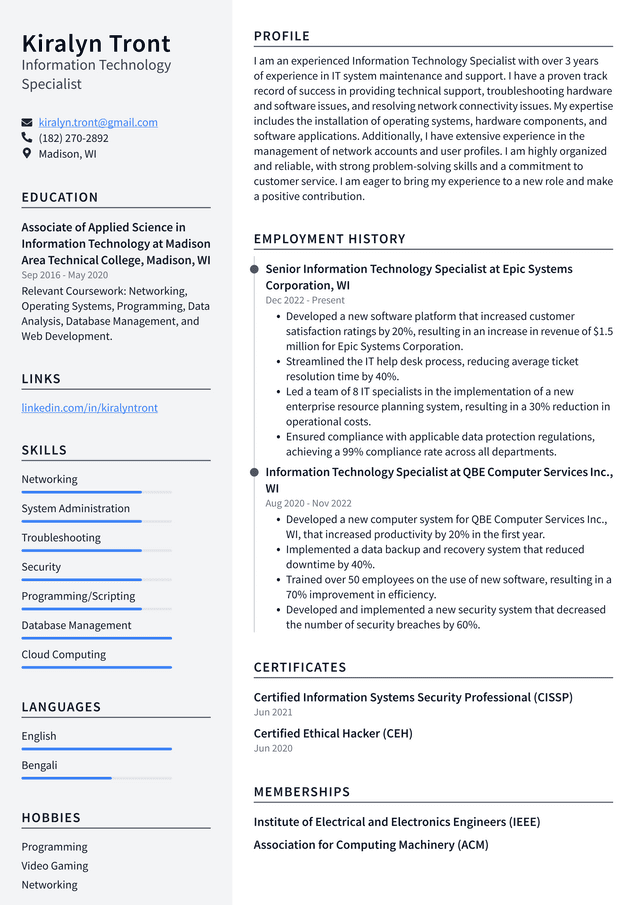Information Technology Specialist Cyber

The Evolving Role of Information Technology Specialists in Cybersecurity

The rapid growth of technology has led to an increased reliance on digital systems, resulting in a heightened risk of cyber threats. As a result, the role of Information Technology (IT) specialists has evolved to include a strong focus on cybersecurity. In this blog post, we will explore the responsibilities of IT specialists in cybersecurity, the skills required to excel in this field, and the importance of staying up-to-date with the latest technologies and threats.
Responsibilities of IT Specialists in Cybersecurity

IT specialists play a crucial role in protecting computer systems, networks, and sensitive data from cyber threats. Some of the key responsibilities of IT specialists in cybersecurity include:
- Monitoring and incident response: IT specialists must continuously monitor computer systems and networks for signs of suspicious activity and respond quickly in the event of a security incident.
- Risk assessment and mitigation: IT specialists must identify potential vulnerabilities and implement measures to mitigate risks, such as installing firewalls and intrusion detection systems.
- Security testing and evaluation: IT specialists must conduct regular security testing and evaluation to identify weaknesses and ensure that systems are secure.
- Compliance and regulatory requirements: IT specialists must ensure that organizations comply with relevant laws and regulations, such as the General Data Protection Regulation (GDPR) and the Payment Card Industry Data Security Standard (PCI DSS).
- Employee education and awareness: IT specialists must educate employees on cybersecurity best practices and ensure that they understand the importance of cybersecurity.
Skills Required to Excel in Cybersecurity

To excel in cybersecurity, IT specialists must possess a range of technical and soft skills, including:
- Technical skills: IT specialists must have a strong understanding of computer systems, networks, and cybersecurity technologies, such as firewalls, intrusion detection systems, and encryption.
- Problem-solving skills: IT specialists must be able to analyze complex problems and develop effective solutions.
- Communication skills: IT specialists must be able to communicate technical information to non-technical stakeholders, such as employees and management.
- Analytical skills: IT specialists must be able to analyze data and identify trends and patterns.
- Certifications and training: IT specialists must stay up-to-date with the latest technologies and threats by pursuing relevant certifications and training, such as CompTIA Security+ and Certified Information Systems Security Professional (CISSP).
Importance of Staying Up-to-Date with the Latest Technologies and Threats

The cybersecurity landscape is constantly evolving, with new threats and technologies emerging all the time. IT specialists must stay up-to-date with the latest developments to ensure that they are equipped to protect their organizations from cyber threats. Some of the key trends and technologies that IT specialists should be aware of include:
- Cloud security: As more organizations move to the cloud, IT specialists must understand how to secure cloud-based systems and data.
- Artificial intelligence and machine learning: IT specialists must understand how to use artificial intelligence and machine learning to enhance cybersecurity, such as using machine learning to detect anomalies.
- Internet of Things (IoT) security: IT specialists must understand how to secure IoT devices, which are increasingly being used in a range of applications, from smart homes to industrial control systems.
- Cybersecurity frameworks: IT specialists must be familiar with cybersecurity frameworks, such as the National Institute of Standards and Technology (NIST) Cybersecurity Framework, which provide a structured approach to managing cybersecurity risk.
Conclusion

In conclusion, the role of IT specialists in cybersecurity is critical to protecting organizations from cyber threats. IT specialists must possess a range of technical and soft skills, including technical expertise, problem-solving skills, and communication skills. They must also stay up-to-date with the latest technologies and threats, such as cloud security, artificial intelligence and machine learning, IoT security, and cybersecurity frameworks.
What is the most important skill for an IT specialist in cybersecurity to possess?

+
The most important skill for an IT specialist in cybersecurity to possess is a strong understanding of computer systems, networks, and cybersecurity technologies, such as firewalls, intrusion detection systems, and encryption.
How can IT specialists stay up-to-date with the latest technologies and threats?

+
IT specialists can stay up-to-date with the latest technologies and threats by pursuing relevant certifications and training, such as CompTIA Security+ and Certified Information Systems Security Professional (CISSP), and by attending industry conferences and workshops.
What is the importance of cybersecurity frameworks in managing cybersecurity risk?

+
Cybersecurity frameworks, such as the NIST Cybersecurity Framework, provide a structured approach to managing cybersecurity risk, enabling organizations to identify, protect, detect, respond to, and recover from cyber threats.



